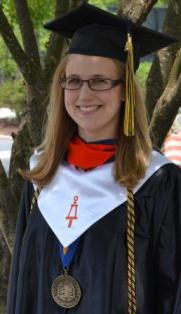 Alumnus Ashley Polhemus recently earned a Whitaker International Fellowship. A current or recent alumnus of a biomedical engineering program (or a closely-related field) may become a Whitaker Fellow after taking part in a national competition. The Whitaker International Program covers all travel and living expenses for Whitaker Fellows to go overseas to do research for one year. To get the award, you have to find a research institution outside of the US who will take you and support your research for the year-long award period. You have to work with them to develop a research proposal, and then submit your application to the Whitaker committee.
Alumnus Ashley Polhemus recently earned a Whitaker International Fellowship. A current or recent alumnus of a biomedical engineering program (or a closely-related field) may become a Whitaker Fellow after taking part in a national competition. The Whitaker International Program covers all travel and living expenses for Whitaker Fellows to go overseas to do research for one year. To get the award, you have to find a research institution outside of the US who will take you and support your research for the year-long award period. You have to work with them to develop a research proposal, and then submit your application to the Whitaker committee.
Ashley will be doing research on orthopaedic implants at the Laboratory for Biomechanics and Implant Research at the University of Heidelberg in Heidelberg, Germany. The fellowship itself covers living and travel expenses, and can cover some tuition if the fellows pursue a Master’s degree overseas.
Ashley will be starting the fellowship in June of 2014, after she receives her Master’s degree at Johns Hopkins. She will be investigating modes of failure in hip replacement devices and looking at the corrosion between the different pieces of modular implants after they have failed and been explanted from patients.
Hip and knee implants are now frequently made up of several pieces that the surgeon can mix and match to fit individual patients. This makes the devices more comfortable, and can minimize complications associated with having too big or too small of an implant. However, relative motion, called micromotion, can occur between the pieces during walking and corrosive reactions take place in crevices. Both of these things can lead to harmful ion generation and device failure, and are undesirable for a long term implant. Ashley will be doing mechanical and chemical testing to investigate these modes of failure, with the hope that understanding these mechanisms will lead to improved implants with longer lifespans.
Ashley has been accepted to the Master of Science in Engineering in Bioengineering Innovation and Design at Johns Hopkins. This program is a 1-year Master’s program (May to May) that focuses on the development of medical devices driven by clinical need. In the summer, she will be doing clinical rotations in the Hopkins hospital and then at a hospital in a developing country (Kenya, Tanzania, Nepal or India- not sure which one yet). During the year, in addition to classes, students break into teams and complete two major design projects: one that could be marketable in the United States, and another that has to do with Women’s and Natal health that can be used inexpensively in developing countries.
Ashley states “I find it incredibly cool that we can replace body parts and systems with artificial devices, and would like to apply the expertise I gain in Germany to this field in the future. After the research experience, I hope to go into R&D in a medical device company.”
Learn more:
